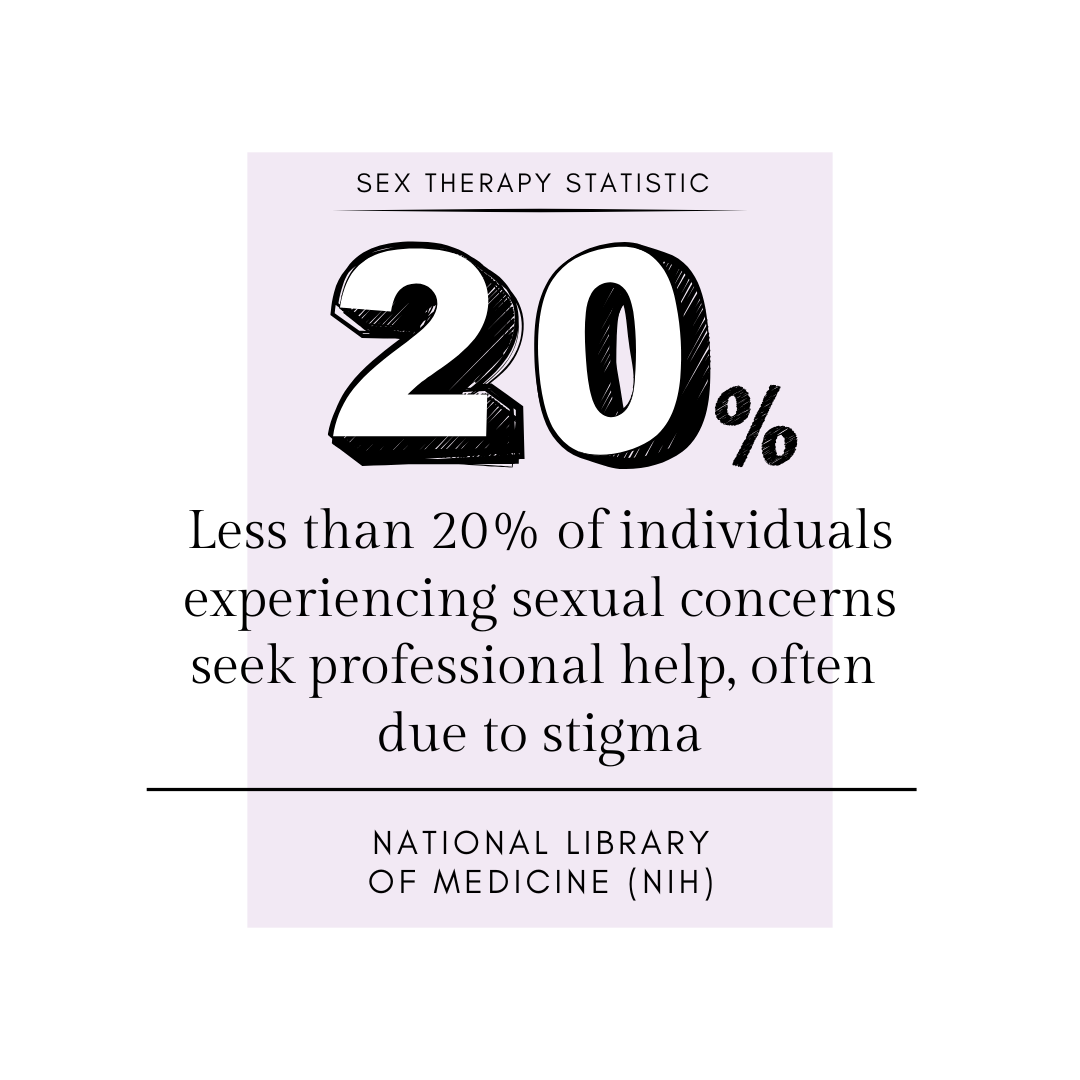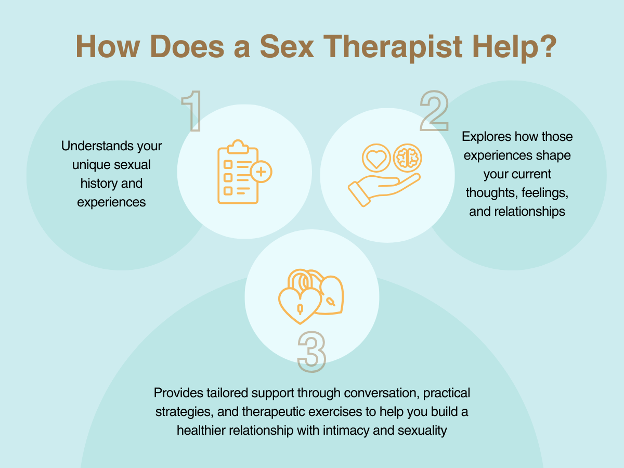Sex Therapy
Reconnect and nurture meaningful bonds in your relationship, together

Intimacy Through Connection
Intimacy is a cornerstone of human connection, yet it is common for individuals and couples to face challenges that disrupt this vital bond.
Whether you are experiencing mismatched desires, performance anxiety, or barriers due to past trauma, the impact on your relationship and self-esteem can feel overwhelming. Therapy offers a safe, non-judgmental space to explore these concerns, understand their roots, and develop tools to rebuild closeness and trust.
Therapy will help you explore the core of intimacy challenges, uncover solutions tailored to your needs, and provide strategies to nurture healthy and fulfilling relationships.

What is Sex Therapy?

Sex therapy is a specialized form of talk therapy designed to address psychological, emotional, and relational issues related to sexual health. It provides a safe and supportive environment for individuals and couples to explore intimacy challenges and develop deeper connections.
43% of women and 31% of men report experiencing sexual dysfunction at some point in their lives.
Sexual health is influenced by factors such as relationship dynamics, personal history, and mental health. These issues are often intertwined with feelings of shame, stigma, or confusion, making it difficult for many to seek help. Through open dialogue and evidence-based techniques, sex therapy empowers clients to overcome these barriers and create meaningful change in their relationships and lives.
Why Does Sexual Health Matter?
Does intimacy issues affect other areas of my life?
Sexual health is a vital component of overall well-being and quality of life. When intimacy issues go unresolved, they can significantly impact various aspects of a person's emotional, physical, and relational health:

Increased Relationship Conflict and Dissatisfaction:
Challenges in sexual health often lead to misunderstandings, unmet needs, and feelings of resentment, which can escalate into ongoing conflicts. Over time, this can weaken the emotional and physical bond between partners, reducing overall relationship satisfaction.

Reduced Self-Esteem and Feelings of Shame:
Struggles with intimacy may result in negative self-perceptions, causing individuals to feel inadequate or ashamed. This emotional burden can extend beyond the bedroom, affecting confidence in other areas of life.

Physical Health Implications:
Sexual dysfunction and intimacy challenges are sometimes linked to physical health conditions, such as hormonal imbalances, cardiovascular issues, or chronic pain, which can further exacerbate stress and anxiety.

Mental Health Challenges:
Unaddressed sexual health concerns can contribute to or worsen mental health conditions, including heightened stress, low mood, or feelings of isolation. These challenges often create a cycle that reinforces avoidance or withdrawal.

Impact on Family Dynamics:
When sexual health issues persist, they can affect not only the partners involved but also the dynamics of the family and social circles, creating ripple effects on broader support networks.
Addressing these issues through therapy provides an opportunity for individuals and couples to identify underlying causes, develop effective communication, and rebuild intimacy. The benefits extend beyond the relationship itself, promoting self-confidence, emotional resilience, and overall well-being.
Lets us Help you Find the Right Match
How Can Therapy Help?
Sex Therapy Enhances Communication and Satisfaction
Therapeutic approaches, including Cognitive Behavioral Therapy (CBT) and Emotionally Focused Therapy (EFT), are evidence-based and effective in addressing a range of concerns, such as:
- Mismatched Libido: Helping partners understand and navigate differences in sexual desire through improved communication and mutual compromise.
- Performance Anxiety or Erectile Dysfunction: Identifying and addressing underlying fears or pressures, enhancing confidence and comfort in intimate settings.
- Overcoming Guilt or Shame: Reducing the burden of negative feelings tied to cultural or societal stigma, fostering self-acceptance and emotional freedom.
- Healing from Past Trauma: Processing and recovering from experiences that may interfere with sexual health or intimacy, ensuring a safe and supportive path forward.
Studies demonstrate that couples therapy significantly enhances communication and satisfaction for approximately 70% of couples. Individual therapies also show measurable success in alleviating sexual health challenges and improving overall well-being.

Sex therapy provides a supportive space to address sensitive and complex issues, promoting healthier communication, intimacy, and understanding in relationships. It can help individuals and couples build confidence, process emotions, and overcome psychological barriers impacting their sexual health.
By addressing these concerns, sex therapy not only enhances intimate relationships but also contributes to greater emotional and psychological resilience.
Support Starts Here
Sex therapy can uncover the underlying causes of intimacy challenges while offering tools to rebuild confidence, connection, and satisfaction in your sexual relationship
What is a Sex Therapist?
A sex therapist is a licensed professional trained to help individuals or couples navigate emotional or psychological challenges that impact sexual well-being. This can include addressing concerns like intimacy struggles or performance-related stress.
Sex therapists often come from various professional backgrounds, such as social work, psychology, or medicine, but they have advanced training in sexual health and related issues. Some therapists may also hold additional designations, such as being a Certified Sex Therapy Informed Professional, which reflects specialized training in supporting clients with sexual health concerns. They provide a supportive and confidential environment to explore and overcome these challenges.

FAQs
Therapy works best when the 'fit' is right with your therapist. That’s why we carefully match you with someone whose expertise fits your needs and preferences. Building a strong therapeutic relationship is key to creating a supportive and effective experience.
Before meeting your therapist, you’ll complete a brief intake form. Your first 50‑minute session focuses on what brings you in, your goals, relevant history, and what success would look like. We’ll explain confidentiality and co‑create a plan so you know what comes next. It’s normal to feel nervous—your therapist will guide the pace.
The frequency of sessions depends on your needs and goals. Many people start with weekly or bi-weekly appointments and adjust as they make progress. The total number of sessions is unique to you—your therapist will work with you to find the right approach.
We use a combination of evidence-based approaches to address sexual difficulties. Many clients benefit from Cognitive Behavioural Therapy (CBT) to challenge unhelpful thought patterns, and from Emotionally Focused Therapy (EFT) to explore the emotional patterns that shape intimacy.
The Gottman Method offers practical strategies to improve communication, reduce conflict, and build trust—foundations that are often key to resolving sexual concerns. Therapy may also include structured approaches designed to reduce pressure and encourage reconnection.
Your therapy journey will be tailored to your comfort level and goals, creating a supportive path toward greater confidence, intimacy, and satisfaction.
Most of our services are covered by extended health benefit plans. Coverage varies with every plan, so please check your specific plan or contact your provider to confirm your benefits.
Most employer benefits cover therapy with a Registered Social Worker (MSW, RSW) or a Registered Psychotherapist (RP). We can direct bill to most major insurers when your plan allows it; otherwise, we email insurance‑ready receipts after your session.
Not sure yet? Let’s talk it through.
If you’d like to ask questions or explore your options first, book a free 20-minute matching consult or give us a call (226-752-8857) . One of our team members will help you find the right therapist and next steps that feel comfortable for you.
%20(1).png?width=200&height=80&name=Trillium%20Counselling%20Logo%20(999%20x%20398%20px)%20(1).png)

















